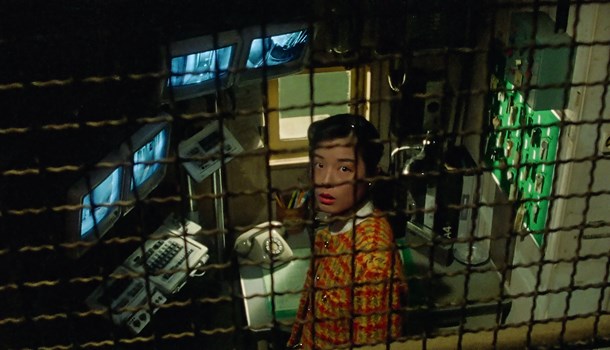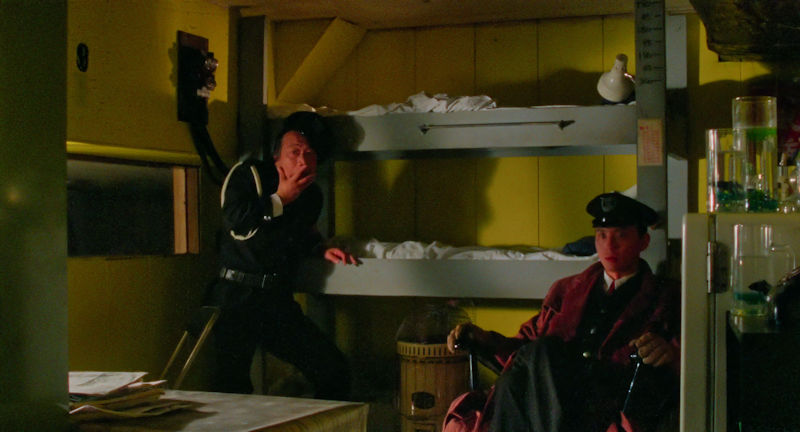
Written by Richard Durrance on 05 Sep 2023
Distributor Third Window • Certificate 15 • Price £17.99
I suspect I am the odd one out, because I’ve only made it to the end of one Kiyoshi Kurosawa film, and that was Tokyo Sonata. I’d tried a few of his horror works and for all that I appreciated their atmosphere I found he laboured the storytelling, to the point I wished he’d just get on with it. Maybe I was having a few bad days and maybe one day I’ll return to them and have a revelation.
A good place to return to them though presented itself in a new form, in the shape of the Third Window upcoming release of The Guard from Underground, Kurosawa’s 1992, Director’s Company film. An intriguing opportunity as Director’s Company existed over the course of about ten years, which set out to provide a young director’s artistic freedom outside the mainstream, even if sometimes (and as we’ll see here) on a shoestring. But then when did a shoestring ever stop a talented filmmaker?
Stuck in a cab, Narushima (Makiko Kuno) is on her way to her first day at work at trading company in the art buying department known as Section 12, which is overseen by the awful Kurume (Ren Osugi). Also starting that day is Fujimaru (Yutaka Matsushige), a security guard who happens to be an ex-sumo wrestler and murderer who managed to get off scot-free and seems to take a fancy to her.
To say that there is more than a touch of the absurd about The Guard from Underground would be an understatement because one of the aspects that I felt really elevated the film was how it actively embraces it. Though ostensibly a slasher film of sorts it never really feels like one because of the tone of the film. It has hints of satire and a definite stone-cold sly sense of menacing humour to it that is apparent right from the off. As Narushima is stuck in her cab, the driver seems very impolite; he hawks phlegm out the window, he talks non-stop about the ex-wrestler who got off a murder charge and is very, very insistent she stays in his cab (admittedly for the money but he seems unable to catch onto her discomfort). Nevertheless, as a way to set the tone it does so effectively as we immediately realise that wherever Narushima is going, something is not going to be right.
And how right that is, because it’s clearly a very strange company. Even when met at the door by the older Security guard, Mamiya, it appears that her destination doesn’t exist: Section 12. What Section 12? Oh Section 12 that just happens to be the brainchild of the head of HR, the apparently dangerous Hyodo (Hatsunori Hasegawa), who seems to be more interested in buying art or sleeping than anything else.
Then as Fujimaru starts to kill the staff, the tone of the film becomes clearest and is arguably slightly iconoclastic. Whereas many films might go full hysteria, if anything Kurosawa amps up the stone-faced absurdism that makes what could be some odd characterisation entirely believable. There’s also a lovely lack of exposition. We never really know why Fujimaru is doing what he is, but somehow it never matters because it’s the impact of his actions that are key. I also liked how the film avoided what is often for me the worst aspect of slasher films, where the killer seems to be downright omnipotent. Fujimaru’s just a person, OK, a killer, but a person, and he never tries to hide who or what he has done, almost seeming disinterested in his murderous activities. Early on this makes an amusingly absurd sense, the older security guard accepting the odd murder and why not? it helps him out. Because of this we never get lost in the old "oh for fecks sake why is this character doing this, or going there, or putting themselves in harm’s way?" nonsense. And that is really one of the film’s great strengths, because it so embraces its straight-facedly absurd aspects means it never becomes tiresome as many slasher films can to all except the aficionados. I think the key here is how Kurosawa creates a sense of internal verisimilitude and logic to the film, and that’s no easy feat.
It’s also a really well shot film. Considering you can spot the budget is peanuts from scene one, it makes the best of what they have, close up shooting and dimly, often dirty green-grey lighting to create a sense of disturbing intimacy. Add to this the very obvious sense of the sinister and even if you know where much of the story is going, because it has such a relaxed, ironic viewpoint that means it never becomes the point. Yes, there is blood, but the film never indulges in it. Rather it allows the most awful moments to speak for themselves, and Fujimaru is always inscrutable in the way perhaps that the best Michael Myers types characters are, going back to Anthony Perkins in Psycho, where any attempt to understand them will be pointless. Yet, like Perkins in Psycho, Fujimaru seems to have a reason for why he is doing what he is doing, and even though he never believes for a moment he’ll get away with a thing. It’s odd because though it might seem lazy, if anything it adds an extra dimension to the film. It’s clear he knows why he is doing what he is doing and though on one level an obsession with Narushima is suggested that’s not really the point or the reason. The point and reason is out of the grasp of the other characters and us.
While perhaps an aside and very likely unintentional but I have to say I did love how Fujimaru in his long coat made me think he was meant to be a mixture of Henry Fonda in Once Upon A Time in the West and Tony Todd in Candyman (which of course came out the same year, so that last one seems most unlikely).
I enjoyed The Guard from Underground more than I expected to, perhaps because it makes a lot from very little and I suspect there will be some ironic horror fans who will cheer and whoop at moments I may not have. But that doesn’t matter because if anything the joy of the film is making me want to finally delve back into Kiyoshi Kurosawa’s films once again, to see if perhaps I really was having a bad day or ten.


Long-time anime dilettante and general lover of cinema. Obsessive re-watcher of 'stuff'. Has issues with dubs. Will go off on tangents about other things that no one else cares about but is sadly passionate about. (Also, parentheses come as standard.) Looks curiously like Jo Shishido, hamster cheeks and all.
posted by Richard Durrance on 08 Jan 2026
posted by Richard Durrance on 17 Dec 2025
posted by Richard Durrance on 12 Dec 2025
posted by Ross Locksley on 09 Dec 2025
posted by Richard Durrance on 28 Nov 2025
posted by Richard Durrance on 25 Nov 2025
posted by Richard Durrance on 18 Nov 2025
posted by Richard Durrance on 14 Nov 2025